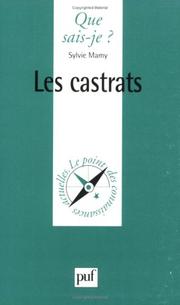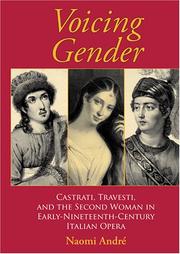| Listing 1 - 10 of 10 |
Sort by
|
Book
ISBN: 2130494315 9782130494317 Year: 1999 Volume: 3402 Publisher: Paris : Presses universitaires de France,
Abstract | Keywords | Export | Availability | Bookmark
Book
ISBN: 2246406811 9782246406815 Year: 1989 Publisher: Paris : B. Grasset,
Abstract | Keywords | Export | Availability | Bookmark
Book
ISBN: 3666310702 3647310700 3525310706 9783525310700 Year: 2019 Publisher: Göttingen : Vandenhoeck & Ruprecht,
Abstract | Keywords | Export | Availability | Bookmark
 Loading...
Loading...Choose an application
- Reference Manager
- EndNote
- RefWorks (Direct export to RefWorks)
Kastratensänger standen bislang vor allem im Mittelpunkt des Forschungsinteresses der Musik- und Theaterwissenschaften. Dabei wurden vor allem ihr Wirken auf den Bühnen des italienischen Musiktheaters des 17. und 18. Jahrhunderts oder die Rezeption der hohen Männerstimme auf das barocke Publikum beleuchtet. Die vorliegende geschichtswissenschaftliche Studie konzentriert sich hingegen auf die Personen als soziale Akteure in der Spätphase dieses Phänomens im 18. und frühen 19. Jahrhundert, wobei exemplarisch vier mitteleuropäische Fürstenhöfe (Wien, München, Dresden, Stuttgart) in den Blick genommen werden.In detaillierten Analysen der Lebenswelten des Hofes und der Residenzstadt fächert die Autorin auf, welchen hohen Stellenwert Kastratensänger innerhalb der höfischen Machtrepräsentation bis zum Schluss besaßen, wie sie sich innerhalb höfischer Anstellungsstrukturen immer wieder erneut positionierten, mit den Bewohnern der Residenzstädte interagierten und welche wichtigen Rollen sie gegenüber Familienangehörigen einnahmen.Insbesondere durch die Untersuchung des individuellen Umgangs mit dem vermeintlichen körperlichen Defizit kann sie zeigen, dass die Annahme, Kastraten seien in der Endphase ihres Bestehens grundsätzlich als defizitäre »verstümmelte Körper« wahrgenommen worden, revidiert werden muss. Auf diese Weise leistet die Autorin einen innovativen Beitrag zur Kultur- und Geschlechtergeschichte am Übergang von der Frühen Neuzeit ins 19. Jahrhundert.
Castrati. --- Evirati --- Eunuchs --- Singers --- 1700-1899 --- Central Europe. --- Europe, Central

ISBN: 2870095074 9782870095072 Year: 1994 Volume: *38 Publisher: Liège : Mardaga,
Abstract | Keywords | Export | Availability | Bookmark
 Loading...
Loading...Choose an application
- Reference Manager
- EndNote
- RefWorks (Direct export to RefWorks)
Book
ISBN: 2213030960 9782213030968 Year: 1993 Publisher: Paris : Fayard,
Abstract | Keywords | Export | Availability | Bookmark
 Loading...
Loading...Choose an application
- Reference Manager
- EndNote
- RefWorks (Direct export to RefWorks)

ISBN: 2246484014 9782246484011 Year: 1994 Publisher: Paris Grasset
Abstract | Keywords | Export | Availability | Bookmark
 Loading...
Loading...Choose an application
- Reference Manager
- EndNote
- RefWorks (Direct export to RefWorks)
Castrati --- Farinelli, --- Castrats --- Opéras --- Opera --- Operas --- Opéra --- Opéras --- Performances --- Biography. --- Interprétation --- Biographies --- Singers --- Biography --- 78.77.3 Farinelli --- Castrati - Italy - Biography --- Farinelli, - 1705-1782

ISBN: 2130495036 9782130495031 Year: 1998 Volume: 3417 Publisher: Paris PUF
Abstract | Keywords | Export | Availability | Bookmark
 Loading...
Loading...Choose an application
- Reference Manager
- EndNote
- RefWorks (Direct export to RefWorks)
Music --- Theatrical science --- anno 1500-1799 --- anno 1800-1899 --- anno 1900-1909 --- Castraten --- Castrati --- Castrats --- Evirati --- Eunuchs --- Singers --- 78.77.3

ISBN: 0253346444 025321789X 9780253346445 Year: 2006 Publisher: Bloomington, Ind. Indiana University Press
Abstract | Keywords | Export | Availability | Bookmark
 Loading...
Loading...Choose an application
- Reference Manager
- EndNote
- RefWorks (Direct export to RefWorks)
History of Italy --- Musicians --- anno 1800-1899 --- Opera --- Feminism and music. --- Heroines in opera. --- Heroes in opera --- Castrati --- Opéra --- Féminisme et musique --- Héroïnes à l'opéra --- Héros à l'opéra --- Castrats --- Opéra --- Féminisme et musique --- Héroïnes à l'opéra --- Héros à l'opéra --- Italy --- Gender --- Theatre --- Cross-dressing --- Book
Book
ISBN: 9781580465328 1580465323 9781782046097 1782046097 Year: 2015 Volume: 125 Publisher: Rochester, NY : University of Rochester Press,
Abstract | Keywords | Export | Availability | Bookmark
 Loading...
Loading...Choose an application
- Reference Manager
- EndNote
- RefWorks (Direct export to RefWorks)
Venanzio Rauzzini (1746-1810), the celebrated Italian castrato, is best known for his performance in Mozart's Lucio Silla in 1772, with which Mozart was so pleased that he composed for the singer the famous motet Exsultate Jubilate. In 1774, Rauzzini moved to London where he performed three seasons of serious operas at the King's Theatre. From 1777 until his death in 1810, he was the director of the concert series in Bath, a series that matched the prestige of any that were given in London. In addition, he composed prolifically, writing music for eleven operas. This book is a study of Rauzzini's remarkable yet often overlooked career in Britain. Paul Rice chronicles Rauzzini's performances at the King's Theatre and examines his leadership of the Bath subscription concerts from 1780-1810, recovering much of the repertory. Rice shows in detail how Rauzzini responded musically to the social and political conditions of his adopted country, and analyzes the castrato's reception, as well as compositional choices, shedding new light on changing musical tastes in late eighteenth-century Britain. Paul F. Rice is professor of musicology at the School of Music, Memorial University of Newfoundland.
Castrati --- Music --- Castrats --- Musique --- Biography --- History and criticism. --- Biographies --- Histoire et critique --- Rauzzini, Venanzio, --- Great Britain --- 18th century --- History and criticism --- Art music --- Art music, Western --- Classical music --- Musical compositions --- Musical works --- Serious music --- Western art music --- Western music (Western countries) --- Evirati --- Eunuchs --- Singers --- Rauzzini, V. --- Bath subscription concerts. --- Britain. --- King's Theatre. --- Memorial University of Newfoundland. --- Mozart. --- Paul F. Rice. --- Venanzio Rauzzini. --- castrato soprano. --- composer. --- cultural leader. --- eighteenth-century Britain. --- music. --- social and political conditions.
Book
ISBN: 9781843843511 184384351X 9781782041108 9781843845249 1782041109 1843845245 Year: 2013 Publisher: Cambridge : D.S. Brewer,
Abstract | Keywords | Export | Availability | Bookmark
 Loading...
Loading...Choose an application
- Reference Manager
- EndNote
- RefWorks (Direct export to RefWorks)
Castration and castrati have always been facets of western culture, from myth and legend to law and theology, from eunuchs guarding harems to the seventeenth and eighteenth-century castrati singers. Metaphoric castration pervades a number of medieval literary genres, particularly the Old French fabliaux - exchanges of power predicated upon the exchange or absence of sexual desire signified by genitalia - but the plain, literal act of castration and its implications are often overlooked. This collection explores this often taboo subject and its implications for cultural mores and custom in Western Europe, seeking to demystify and demythologize castration. Its subjects include archaeological studies of eunuchs; historical accounts of castration in trials of combat; the mutilation of political rivals in medieval Wales; Anglo-Saxon and Frisian legal and literary examples of castration as punishment; castration as comedy in the Old French fabliaux; the prohibition against genital mutilation in hagiography; and early-modern anxieties about punitive castration enacted on the Elizabethan stage. The introduction reflects on these topics in the context of arguably the most well-known victim of castration in the middle ages, Abelard. Larissa Tracy is Associate Professor of Medieval Literature at Longwood University. Contributors: Larissa Tracy, Kathryn Reusch, Shaun Tougher, Jack Collins, Rolf H. Bremmer Jr, Jay Paul Gates, Charlene M. Eska, Mary A. Valante, Anthony Adams, Mary E. Leech, Jed Chandler, Ellen Lorraine Friedrich, Robert L.A. Clark, Karin Sellberg, Lena Wånggren
Literature, Medieval --- Castration in literature. --- Castration. --- Civilization, Medieval. --- History and criticism. --- Civilization, Medieval --- Medieval civilization --- Middle Ages --- Civilization --- Chivalry --- Renaissance --- Emasculation --- Gonadectomy --- Animal contraception --- Male contraception --- Sterilization (Birth control) --- Testis --- Veterinary surgery --- History --- Surgery --- Abelard. --- Archaeology. --- Castrati Singers. --- Cultural Mores. --- Cultural mores. --- Culture. --- Custom. --- Demystify. --- Demythologize. --- Eunuchs. --- Gender Studies. --- Genitalia. --- Harems. --- Law. --- Literal castration. --- Literary Motifs. --- Medieval Castration. --- Metaphoric castration. --- Middle Ages. --- Old French Fabliaux. --- Old French fabliaux. --- Punishment. --- Taboo subject. --- Western Europe. --- Eunuchs --- History.
| Listing 1 - 10 of 10 |
Sort by
|

 Search
Search Feedback
Feedback About UniCat
About UniCat  Help
Help News
News